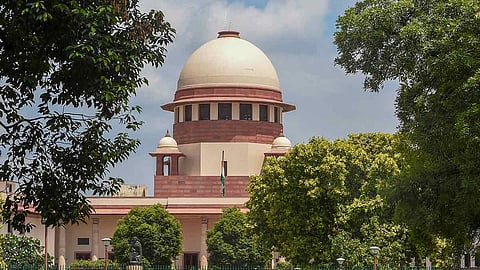Petition in SC to overturn Kerala HC’s exemption of political parties from POSH Act
Follow TNM’s WhatsApp channel for news updates and story links.
A fresh petition has been filed in the Supreme Court of India seeking to overturn a 2022 Kerala High Court judgement exempting political parties from the ambit of the Sexual Harassment of Women at Workplace (Prevention, Prohibition and Redressal) Act, 2013, known as the POSH Act. The petition argues that excluding women political workers from the protection offered by the POSH Act is arbitrary and violative of their fundamental rights.
Filed by Supreme Court advocate Yogamaya MG, through Advocate-on-Record Sriram P, the Special Leave Petition (SLP) challenges the Kerala HC’s judgement from 2022, which said that political parties are under no obligation to set up Internal Complaints Committees (ICCs) to hear complaints of sexual harassment, as mandated by the POSH Act. The HC cited the absence of a formal employer-employee relationship between members of a political party as the reason for the exemption.
The new SLP contends that this narrow interpretation “defeats the very object of the law” and leaves women in politics vulnerable.
The petition seeks to declare political parties as ‘employers’ under Section 2(g) of the POSH Act, thereby making it mandatory for them to constitute ICCs. Respondents named include the Bharatiya Janata Party (BJP), Congress, Aam Aadmi Party (AAP), Communist Party of India (Marxist) (CPI(M)), Communist Party of India (CPI), Nationalist Congress Party (NCP), All India Trinamool Congress (AITC), Bahujan Samaj Party (BSP), National People's Party (NPP), and All India Professionals' Congress (AIPC), along with the Union of India and the Election Commission of India.
“The arbitrary denial of these protections violates their fundamental rights under Articles 14, 15, 19, and 21 of the Constitution,” the petition argues, adding that women political workers, including volunteers, interns, campaigners, and grassroots activists, are left without any formal grievance redressal mechanism, even though they operate in highly vulnerable environments.
‘A concerning gap in protection’
The SLP underscores inconsistencies in the current system. It states that while the Communist Party of India (Marxist) (CPI(M)) has set up ICCs with external members, the Aam Aadmi Party’s (AAP) committee structure remains unclear. The BJP and Congress, the petition notes, address complaints through disciplinary committees or state units, which it terms as a “deviation from the statutory scheme under the POSH Act.”
Studies cited in the SLP — including a 2014 UN report and a 2016 Inter-Parliamentary Union survey — reveal the scale of the problem: 45% of Indian women politicians reported facing physical abuse and 49% verbal abuse. The petition also recalls instances like the one from 2014, involving Congress leader Nagma, who had to slap a man who allegedly groped her during a public meeting. The SLP states that party mechanisms failed to act, despite public outrage being strong.
International frameworks and need for reforms
The SLP draws from global models such as the Inter-American Model Law on Violence Against Women in Political Life (2017), which prescribe sanctions including disqualification and imprisonment for perpetrators of political harassment.
It also refers to reform methods in countries like the UK and the US, where political parties have set up independent complaint redressal procedures in the wake of the #MeToo movement.
“Implementing POSH mechanisms in political parties is not only required, but long overdue,” the petition argues. “It ensures a safe and equitable environment, enhances women’s participation, and strengthens public trust in these institutions,” it states.
Unless the Supreme Court intervenes, the petition warns, women in politics will continue to be denied “their right to equality, dignity, and a safe working environment.”
In 2024, Yogamaya had filed a writ petition before the apex court, which was disposed of with a direction to submit a representation to the Election Commission of India. That representation was sent on March 17, 2025, but remains unanswered.
According to sources, a subsequent writ petition was filed in July 2025, which was withdrawn in August with liberty to challenge the Kerala High Court ruling. The present SLP, filed on August 22, 2025, takes up that liberty and directly assails the High Court’s verdict.
The matter is yet to be listed for hearing.

